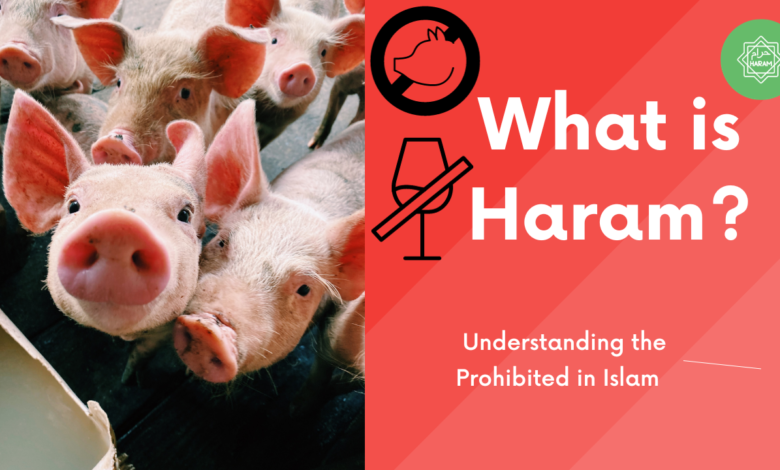
What is Haram?
“Haram” is an Arabic term that means “forbidden” or “prohibited” in Islamic law (Sharia). It refers to actions, behaviors, or substances that are considered sinful or unlawful in Islam.

Introduction
Haram is a term often heard in the context of Islamic teachings and practices, but what exactly does it mean? Haram, in the Islamic faith, refers to anything that is prohibited or forbidden. It signifies actions, behaviors, or substances that are considered sinful or unethical, and Muslims are encouraged to avoid them in their daily lives. Understanding what is considered Haram is essential for Muslims as it helps them lead a life that aligns with their religious beliefs and values.
The Source of Haram
The source of Haram in Islam primarily stems from the Quran, which is the holy book of Islam, and the Hadith, which are the sayings and actions of the Prophet Muhammad (peace be upon him). These two sources serve as the foundation for Islamic jurisprudence, guiding Muslims on what is permissible and what is not. The Quran contains numerous verses that specify certain actions or substances as Haram, while the Hadith provides further elaboration on these prohibitions.
Also Check
- How do I learn about Islam?
- Is taking Bribe is Haram in Islam?
- What Does Haram Mean?
- Is Music Haram?
- Is bitmoji haram?
- Where Was Gautama Buddha Born?
Examples of Haram
- Alcohol and Intoxicants: Consuming alcohol or any intoxicating substances is strictly forbidden in Islam. The Quran explicitly prohibits it, and the harmful effects of intoxicants on one’s judgment and behavior are well-documented.
- Pork and Pork Products: Pork, including pork meat and its by-products, is considered Haram in Islam. The Quran explicitly states that consuming pork is prohibited.
- Usury (Riba): Charging or paying interest on loans is considered Haram. Islam encourages financial transactions that are based on equity and fairness, and the charging of interest is seen as exploitative.
- Theft and Fraud: Stealing, cheating, and fraudulent activities are clearly Haram in Islam. Honesty and integrity are highly valued in Islamic ethics.
- Adultery and Fornication: Engaging in sexual relations outside of marriage is considered sinful. Adultery and fornication are seen as violations of the sanctity of the family and the moral fabric of society.
- Gambling (Maisir): Gambling is prohibited in Islam as it is believed to lead to addiction and financial ruin. It also promotes unfair practices and undermines economic stability.
- Backbiting and Slander: Speaking ill of others behind their backs or spreading false information is considered Haram. Islam promotes good speech, kindness, and the protection of one’s reputation.
- Idolatry (Shirk): Associating partners with Allah or worshipping idols is the gravest sin in Islam. Monotheism is a fundamental pillar of the faith.
- Eating Halal Animals Without Proper Slaughter: In Islam, animals must be slaughtered in a specific way to be considered Halal (permissible). Eating meat from animals not slaughtered in this manner is Haram.
- Engaging in Unlawful Sexual Activities: Engaging in same-sex relationships or any form of non-consensual sexual acts is considered Haram in Islamic teachings.
The Importance of Avoiding Haram
Avoiding Haram is a fundamental aspect of practicing Islam, and there are several reasons for its significance:
- Spiritual Growth: Avoiding Haram actions and substances helps Muslims maintain a pure and spiritually sound life, drawing them closer to Allah.
- Moral and Ethical Guidance: The concept of Haram serves as a moral compass, guiding Muslims toward good behavior and ethical conduct.
- Community Cohesion: Prohibiting harmful actions and substances contributes to the well-being and cohesion of the Muslim community.
- Accountability: Muslims believe in the Day of Judgment when they will be held accountable for their actions. Avoiding Haram ensures they are not burdened with sinful deeds.
Conclusion
Haram is a central concept in Islam, signifying anything that is forbidden or prohibited by Islamic teachings. Muslims are encouraged to avoid Haram actions, behaviors, and substances as a means of leading a life in accordance with their faith and values. Understanding what is considered Haram is crucial for Muslims, as it guides them on the path of spiritual growth, moral conduct, and community well-being. While the examples provided in this article are not exhaustive, they offer a glimpse into the various aspects of life where the concept of Haram is applied.

(FAQs) about “What is Haram?” and their answers:
What does the term “Haram” mean?
“Haram” is an Arabic term that means “forbidden” or “prohibited” in Islamic law (Sharia). It refers to actions, behaviors, or substances that are considered sinful or unlawful in Islam.
What are some common examples of things that are considered Haram in Islam?
Common examples of Haram actions or substances in Islam include consumption of alcohol and pork, engaging in dishonesty or theft, engaging in usury (Riba), and engaging in premarital or extramarital sexual relations.
Who determines what is considered Haram in Islam?
Islamic scholars and jurists, often referred to as “ulema” or “muftis,” interpret the Quran and Hadith (sayings and actions of Prophet Muhammad) to determine what is considered Haram. These interpretations can vary among different Islamic schools of thought.
Are there different degrees of Haram in Islam?
Yes, there are varying degrees of Haram in Islam. Some actions are considered “major sins” (kaba’ir) and are more severe in their prohibition, while others may be considered “minor sins” (sagha’ir). Major sins can have serious consequences both in this life and in the hereafter.
How does one avoid committing Haram acts in Islam?
To avoid committing Haram acts, Muslims are encouraged to gain knowledge of Islamic law, seek guidance from religious scholars, and strive to live according to the teachings of the Quran and Hadith. Regular acts of worship, like prayer and fasting, can also help in avoiding sinful behaviors.
What is the significance of avoiding Haram in Islam?
Avoiding Haram is essential in Islam because it reflects a person’s obedience to Allah’s commands and their commitment to leading a righteous and ethical life. It is believed that avoiding Haram leads to spiritual growth and a closer relationship with God.
What are the consequences of committing Haram acts in Islam?
Committing Haram acts can have both temporal and spiritual consequences. Temporal consequences may include legal penalties in some cases, harm to one’s reputation, or social consequences. Spiritually, it is believed that committing Haram can distance a person from God and result in negative consequences in the hereafter.
Can something that is Haram in one culture or context be permissible in another?
There can be variations in the interpretation of what is considered Haram among different Islamic schools of thought or cultural contexts. However, the core principles of Islamic law, as outlined in the Quran and Hadith, remain constant. It’s important to seek guidance from local religious authorities or scholars for specific cultural or contextual considerations.
Is there a process of seeking forgiveness for committing Haram acts in Islam?
Yes, Islam provides a process for seeking forgiveness and repentance for committing Haram acts. This typically involves sincere remorse, seeking forgiveness from Allah, and making efforts to avoid repeating the sinful behavior. In some cases, acts of charity or good deeds may also be recommended as a form of expiation.
How can one learn more about what is considered Haram in Islam?
To learn more about what is considered Haram in Islam, individuals can study the Quran, Hadith, and the teachings of Islamic scholars. They can also seek guidance from local mosques, imams, or religious scholars who can provide specific information and answer questions related to Islamic law and ethics.



